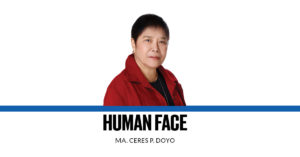Our voters have a rare opportunity in the 2022 elections. Most of us have seen Western movies. Before us now is a case of the bad guys all congregating in one saloon: Bongbong Marcos for President, Sara Duterte for Vice President, Gloria M. Arroyo, prospective Speaker of the House, and the Estrada family. Gathered in one place is a “Confederation of Grafters” (COG), a fitting term. One meaning of the word “cog” is a loaded dice game, an appropriate name for the group.
These four ex-ruling families explain why we are still a Third World country. The COG group represents 39 accumulated years of graft and corruption in government, to wit: Marcos 21 years, GMA 9 years, Estrada three years, and Duterte six years. It’s been 75 years since we regained our independence in 1946, thus the COG group has stolen from us for more than 50 percent of our independent existence. In the scandals of the Marcos, Estrada, and Arroyo presidencies, the looters were fellow Filipinos. But in the Pharmally scandals, the looters are Chinese. Under the Duterte administration, we have opened corruption in our country to foreigners, with the added incentive of providing them the pro bono services of the President in any legal proceedings.
We have all been complaining about the endemic graft and corruption in our government. In Western movies, it is often the case that the sheriff has to hunt for the bad guys. The COG group has obliged by presenting us with all the targets in a single place. The formation of the group is a challenge to our countrymen to reject with finality, once for all, graft and corruption as a tool for governance.
But one problem is evident: There are too many sheriffs going after the bad guys. The good guys could thus end up acting at cross-purposes. It will simplify things if the good guys can just designate the fastest gun among them to round up the bad guys. Meaning, it is time for the opposition to unite behind just one candidate to topple the COG.
If the COG nonetheless wins the elections, the conclusion is that we are a corrupt society with an infinite capacity for graft. We should expect the following results: Our history will be rewritten with the Edsa revolution depicted as an uprising led by a group that deceived our people about the “golden era” under Marcos. The victims of martial law shown in monuments will be depicted as terrorists. Rodrigo Duterte will not be surrendered to the International Criminal Court (ICC). We will claim instead that we have a mature legal system, which rules out ICC intervention. Under the circumstances, it is to be expected that Mr. Duterte will be acquitted by the local courts.
But the greatest danger of a COG victory is that it could be the end of meaningful democracy in our country. The erosion of our freedoms and rule of law that has happened under Mr. Duterte will continue.
In the West Philippine Sea, the loss of our rights to the areas seized by China will become permanent. Our fishermen will be deprived of their livelihood. We could end up as the client state of China.
In a sense, our history is full of ironies. The 1987 Constitution was termed the anti-Marcos constitution. However, its flawed provision providing for a multiparty system without run-off elections is the cause of our current predicament. Had there been a provision for run-off elections, the problem of uniting the opposition is minimized. A run-off election often ends up as a contest between the administration candidate and a single opposition bet. In any developing country with widespread poverty and myriad social problems, an opposition candidate has a fair chance to win in a free election.
Everything depends on our voters. Notwithstanding the infirmities of our Constitution, the foremost consideration in our voters’ minds should be: This is unprecedented—a group of former corrupt rulers of our country now uniting and asking us to restore them to power. Are we going to give them another chance to plunder our country? How will history judge us if we once again elect these people?
* * *
Hermenegildo C. Cruz is a retired career ambassador who served in Chile, Bolivia, the Soviet Union, and the UN. During these assignments, he had the opportunity to study the manipulated elections in Latin America and the single-party elections in the Soviet Union.


